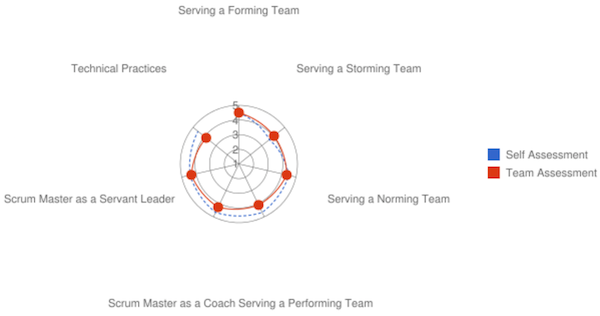Through the course of last year, I served three teams as a Scrum Master at TransFollow. Two of these teams did pure Scrum. One team had additional (ad-hoc) operational responsibilities, and had a Scrum-meets-Kanban way of working. I’ll refer to all three teams as “team” from here on.
In order to improve my Scrum Mastery, I requested the team members to fill out a Scrum Master survey to assess my services. In this post I’ll present a short summary of the results.
The Survey
The survey is largely based on a Scrum Master assessment from Oikosofy. It consists of 55 questions covering 8 categories and takes respondents about 20 minutes to fill out. I asked everybody I served for more than two sprints to fill out the survey.
Summary of results
Respondents
| Survey invitations: | 15 |
| Survey responses: | 10 |
| - Dev team members: | 9 |
| - Product owners: | 1 |
| - Hiring manager: | 1 |
How many sprints did we collaborate
| Average number of sprints: | 22 |
| Minimum number of sprints: | 8 |
| Maximum number of sprints: | 34 |
Overview of my performance

Other results:
I’m very proud and humbled that my former team members are extremely likely to recommend my Scrum Master services to their friends and colleagues (100% NPS). That really means a lot to me.
In addition I got some great quotes AND permission to use them for shameless self promotion :) . Expect those to show up on my site soon.
My learnings
OK, but what has this survey taught me? First of all that my work was really appreciated, which is very rewarding. I’ll do my best to keep this up in other teams I’ll serve.
I also learned my team appreciated my services in their storming phase(s); more than I thought so myself.
What I definitively could have done better, is supporting the development team with their technical practices. I like to think I’m capable and knowledgeable in this area, but the team as a whole rates my services much lower than I assess myself capable of providing (3.8 vs 4.5). I can relate to this assessment by the team; at times I really struggled with helping the team in this area. I often felt I held back out of fear of making decisions for the team. This in fact shows an unwarranted distrust in the development team.
A good Scrum Master is wary of influencing the team. A great Scrum Master can act normally and knows that the team will still make their own decisions.
– Geoff Watts, Scrum Mastery: From Good to Great Servant Leadership
Another valuable piece of feedback I received was with respect to how I handled team failures. The team sometimes felt I took these situations too personally (like a “sad Scrum Mom”) instead of neutrally helping the team inspect and adapt.
Ouch!
I promise to write the prime directive fifty times before going home from work today:
Regardless of what we discover, we understand and truly believe that everyone did the best job they could, given what they knew at the time, their skills and abilities, the resources available, and the situation at hand.
– Norman L. Kerth, Project Retrospectives: A Handbook for Team Reviews
What’s next?
In 2016, I hope I can take some steps towards becoming a great Scrum Master. This survey definitively gave me some directions for this journey.
I’ll specifically focus on improving my coaching and facilitation skills.
Thanks Team!

Comments
Leave a comment